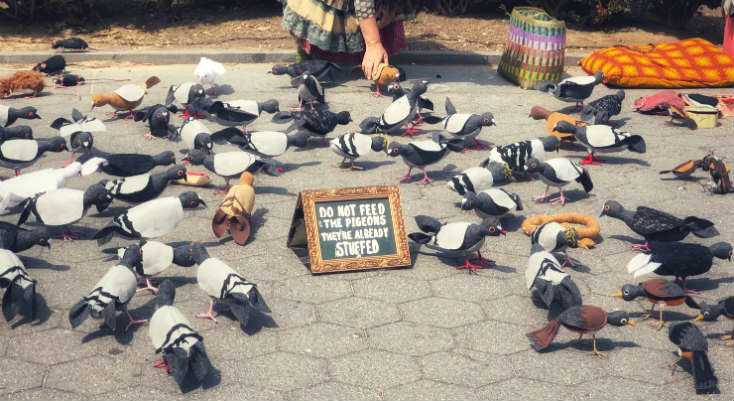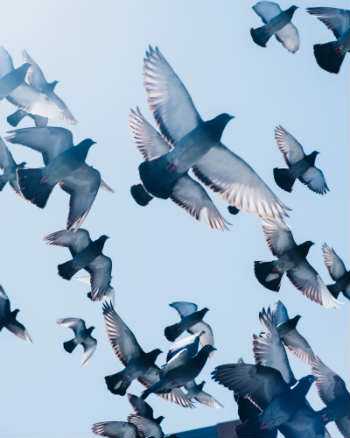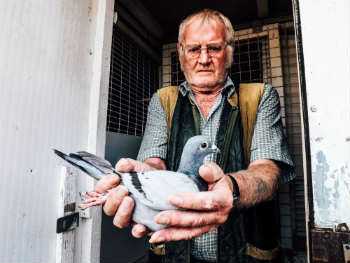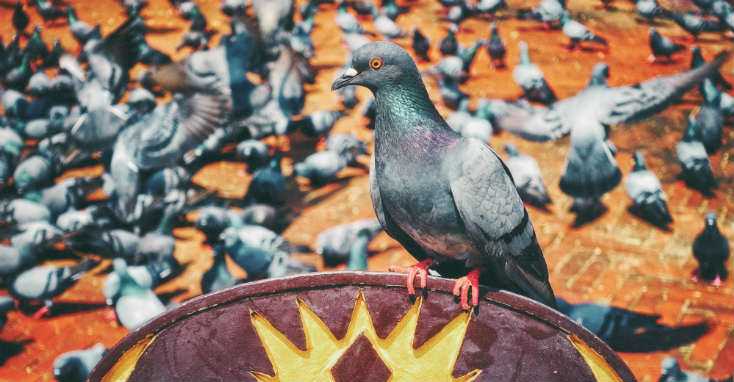How to Get Rid of Pigeons and Keep Them Away?

It is estimated that there are over 400 million pigeons in the world, with nearly every urbanized city being occupied by some number of feral pigeons. Their name is derived from the Latin word pipio, which means “young cheeping.” These feral pigeons have served many purposes through the centuries, from food to fertilizer to communication specialists. They can be found on every continent except Antarctica, dwelling exclusively in densely populated areas.
Pigeons in History
People and pigeons have shared the planet for thousands of years. Archaeologists have uncovered images of pigeons in ancient Mesopotamia – modern day Iraq – that are thought to date back to 3,000 B.C. It is believed that the Sumerians of Mesopotamia were among the first to start breeding white doves from the feral pigeons which are familiar to our crowded cities today.
Though considered mostly a nuisance in our culture today, that was not always the case. Throughout history, pigeons have been worshipped as gods, revered as war heroes, and utilized as messengers. In medieval Europe, pigeon guano (pigeon poop!) was a valuable fertilizer.
It was such a valued commodity that guards had to be stationed outside of pigeon houses to ensure that thieves did not try to steal the guano. In England during the 15th and 16th centuries, pigeon guano was the only known source of saltpeter, which was used for gunpowder.
During both World War I and World War II, carrier pigeons saved many lives, as they were used to deliver messages behind enemy lines. Naval ships brought pigeons on board so, in the event of an attack, they could get the word out to their allies.
Even in ancient times pigeons were used to deliver messages. In the 5th century, B.C., Syria and Baghdad used them for communication between cities. In the ancient Olympic games, pigeons were released to broadcast scores of the sporting events, which is why white doves are symbolically released at the Olympics today.
Pigeons Today

Today’s pigeons dwell almost exclusively in urbanized locations. Despite their bad reputation, pigeons are beautiful birds with colors ranging from blue-gray to green to reddish-purple.
They are monogamous, mate for life, and breed all year long – usually breeding and making their nests in or on buildings.
At six months of age, the female pigeon can begin laying eggs, which are incubated by both the male and female parents. At around 30 days, the fledgling period begins for the baby bird and the process repeats itself. Pigeons have been known to live up to 15 years in some cases, but the typical lifespan is about three years.
The pigeon is one of the most intelligent species in the world. Yet, despite its great service to mankind through the centuries, the presence of pigeons can pose some problems for homeowners and city dwellers.
Pigeon Problems

Although it is important to never touch or pick up pigeon waste with bare hands, that is not usually the way that germs are transmitted. Contaminated pigeon feces are often dropped in the streets, on sidewalks, park benches, and windowsills where they dry out into a powdery substance.
The waste can then be stirred up into the air by wind or foot traffic and inhaled by people. Some of these diseases can include E. Coli and the respiratory disease Histoplasmosis. Pigeons are also transmitters of fleas and mites, which are also nuisances to humans.
Since pigeons also build their nests and breed in buildings, they can cause significant property damage by interfering with electric elements and air conditioning units. Considering the various health and property risks pigeons bring, it is important to find ways to deter them from homes and businesses, just like fighting against cockroaches.
Keep Pigeons Away
Proper home and property maintenance in the city will include deterring or eradicating birds from the area. To reduce the risk of disease and property damage, first try to clean up any pigeon droppings as soon as the waste is discovered. Be sure to wear disposable clothing that covers the skin, shoe coverings, and gloves. Consider the benefits of using an air purifier, as well, to minimize the risk of respiratory disease.
There are many bird control products available on the market, such as control gel, wire barriers, spikes, and shock.

DIY Methods
There are some natural and quick ways to deter pigeons from taking over. Spike strips are designed to make area occupied by pigeons uncomfortable and unappealing. Seeing the spikes will motivate the pigeons to find another home.
Waterproof strings can also be hung around the nesting areas. These will prevent the pigeons from being able to balance on the string and make them less likely to inhabit the area.
Also, never feed pigeons, as they will keep returning to an area they consider a food source.
Be sure to seal off any openings in the attic or chimney, as they are popular dwelling spots for pigeons. Use steel mesh caps or other durable exclusion materials to keep the birds away. Window air conditioning units may also need to be covered with a net to prevent pigeons from getting into it.
Some homeowners may spray the pigeons with a water hose as a deterrent. Also, some old-timers report that hanging mirrors or wind chimes will keep away pigeons, as seeing their reflection scares them.
Since pigeon control is a priority for many home and business owners, we have rounded up some of the best pigeon products on the market to review, including decoys, spikes, gel, tape, and netting.
Best Way to Get Rid of Pigeons: Product Reviews
Bird Decoys
Bird Blinder Scarecrow Fake Owl Decoy – Pest Repellent Garden Protector – (Large) (Spotted)
Set the owl decoy in a windowsill or roof top to scare away unwanted pigeons, as well as other birds and rodents. This large, spotted owl can also be used in the garden or on a patio.
This is a hand-painted statue standing over 16 inches tall. The owl decoy provides a humane method of pest control and has also been known to keep away woodpeckers, rabbits, and raccoons. This product includes two hooks on which it can hang outside or in a window.
It may also be secured on the ground with stakes. Its hollow bottom also offers the option of filling the figure with gravel or sand to keep it secure.
The GiftExpress Scarecrow Bird Repellent Fake Flying Hawk Decoy
Since hawks are feared in the animal kingdom for their hunting prowess, this product may be highly effective at keeping away pigeons. It includes loop and string, as well as a bag to store its removable wings when not in use.
Bird Spikes
The Bird-X Stainless Steel Bird Spikes Kit
A flexible base allows the spikes to be installed on both flat and curved surfaces. It may be used in garages, rooftops, windowsills, fences, or signs. The product comes with adhesive, nails, screws, and ties. Just clean debris such as leaves and sticks out of the spikes occasionally to maintain effectiveness.
The Bird Blinder Stainless Steel Bird Spikes
This stainless-steel product covers up to 33 feet and has no plastic material in it. The manufacturer guarantees the spikes to be weather-resistant.
The spike feature keeps a variety of bird species from landing on building nests on the property. Its durable, long-lasting materials make it a permanent and humane solution to pigeon control.
Bird Repellent Gel
Bird B Gone MMTBG Transparent Bird Gel
The Bird B Gone bird gel can repel pigeons, seagulls, starlings, and sparrows. It can be applied with a standard caulking gun and lasts for one year. Each tube of bird gel will treat an area approximately 10 foot long by 3 inches wide.
Bird Scare Tape
The Premium Quality Bird Deterrent Reflective Tape
Even though it is called “tape”, this product does not contain any adhesive. It just needs to be hung up or tied to repel birds.
The Gardeningwill 5×10 Mosquito Bug Insect Bird Net Barrier
The mesh material is so fine it can even keep away flies. At just around $10, this product is a cost-effective option for use in pigeon repellent.
Get Rid of Pigeons – Conclusion
Pigeons have served many productive purposes through the centuries but now their presence can be destructive. Considering these humane, affordable products for pigeon control can keep homes and properties safe and clean by encouraging feral pigeons to make their homes elsewhere.







